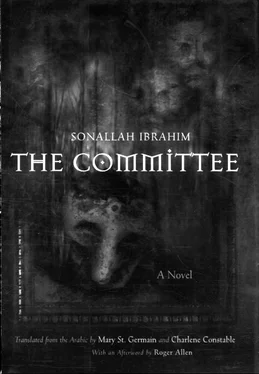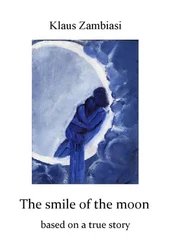I was engaged in finding an explanation for this phenomenon, when, after some examination, I realized it was rooted in the distant past, in the first test I had ever taken, at just a few years of age, and each time thereafter when I stood naked before the cold, indifferent eyes of ruthless people who belonged to a world other than mine. The life of each of them revolves in an independent sphere, not dependent in any way on the outcome of any confrontation between us, which is contrary to my own case.
I wished I was standing before the Committee members again, so that I could make them listen to me. I imagined myself facing them confidently. I went on to pick precise, exact expressions. I got carried away. Sud denly I stood up, put an empty tape in the recorder, and set it cn the table. I faced it as if it were the Committee.
My voice rang out strong and steady in the empty room. "I committed-from the beginning-unpardonable errors. I shouldn't have stood before you, but against you. Every noble effort on this earth should be aimed at eliminating you.
"Let me quickly add that I am not so naive as to imagine that were this achieved, the matter would end there. By the very nature of things, a new Committee would take your place. No matter the beauty of its plans or the perfection of its goals, corruption would soon set in. Even if it started out as a symbol, it would become an obstacle, and sooner or later it in turn would have to be eliminated.
"From my investigations of history and cases similar to mine, I perceived that via this very process-an ongoing process of change and transformation-your group will gradually lose what authority it has, while the power of those like me to confront and resist it will grow.
"However, unfortunately, I won't be here when that takes place, because of the fate allotted me, a fate deriving on the one hand from my ambitions, which exceedec my potential, and my quixotic search for knowledge and, on the other hand, from my entanglement in a reckless but inevitable attempt to challenge your Committee at an unsuitable time and place. But what alleviates my sorrow is my confidence in what will eventually happen, for this is the logic of history and the nature of life."
I didn't exaggerate, and I didn't get carried away talking to the tape recorder. Now, as I considered everything through my impartial eyes, I totaled the gains and losses and found myself not regretting the fate awaiting me. In comparison with other fates-at least in my generation-there was nothing to be ashamed of. What made me truly sorry was that I would miss the great day. But this in itself had no real significance since I was convinced it would come.
When I reached this conclusion, I felt a strange peace of mind which filled my heart with a tranquility I had rarely known. I spent a few intoxicated moments, the likes of which I had only experienced when listening to music. I wanted to prolong these moments right to the end, so I got out my tape recordings, which I took pride in. I leafed through them for a long time, passing over those notable for their delicate, pleasant melodies, such as Mozart and Grieg, or those composers who expressed sorrow, such as Schubert and Tchaikovsky. My soul likewise rejected the enchanted world of Berlioz and Scriabin and the solemn metaphysics of Mahler and Sibelius.
My choice finally came to rest on Cesar Franc, in whom the splendor of doubt evolves into the bliss of certainty, Carl Orff, who erupts with vigor and conflict, Beethoven, who sings of victory and joy after pain, and Shostakovich, who blended all of this with mockery.
Darkness had fallen. I put the recordings of these great geniuses within reach of my hand. I took my favorite place behind the desk, at the final wall of the apartment.
I proceeded to listen to the music, whose notes rang throughout the room. I stayed in my place, tranquil, elated, until dawn.
Then I lifted my wounded arm to my mouth and began to consume myself.
Modern modes of critical analysis have taught us to look closely at the various ways in which works of fiction achieve closure. With the strictures of Henry James in mind regarding so-called happy endings-marriages, inheritances, discoveries of long-lost relatives, not to mention the alternatives proposed by John Fowles in his well-known novel The French Lieutenant's Woman-we are now accustomed to encounters with a wide variety of strategies whereby a novel's narrator chooses to terminate his activities. With "Then I lifted my wounded arm to my mouth and began to consume myself," the final sentence of Sonallah Ibrahim's novel, The Committee, the reader comes face-to-face with a particularly shocking example of this variety, in that the narrator recounts the initial stage of a process whereby he will disappear by self-consumption.
The process he describes is, as we have already learned from the narrative, a direct consequence of the dreadful sentence that has been passed on him by "the Committee" that gives its name to the novel's title. The exact purview of this "Committee" is never mentioned; it is just "the Committee." It has, the narrator informs us, great importance and extensive authority, and yet "officially it [doesn't] exist." However, the narrator's reactions to a summons to appear before it and the various ways i:► which its procedures manage to impinge on and interfere with his lifestyle, professional conduct, and research agenda all convey to the reader a truly disturbing picture of an organization-in fact, a society-in which individuality and difference are considered subversive. In thi; regard, Sonallah Ibrahim can be regarded as a true peer of Franz Kafka in his ability to make use of a disarmingly undramatic level of discourse to convey a reality that is genuinely disturbing in its routine callousness. The mindless bureaucracy that appears to be all-powerful succeeds, almost effortlessly, in creating a general atmosphere of paranoia within which the individual is to be crushed.
Indeed, the Committee in Ibrahim's novel reaches a unanimous decision, one that condemns the narrator to "the harshest punishment on the books," that process of self-consumption with which the narrative concludes. The way in which Sonallah Ibrahim's masterful use of discourse style manages to convey this atmosphere is one of the great achievements of this work of his, as well as others.
The narrator of this unsettling story self-identifies as an Egyptian. However, the Committee itself does not use Arabic as its language. It is further described as being made up of civilians and military personnel. Among prominently mentioned members is a blond man who, among other disarming procedures, conducts an investigation of the narrator's private parts in order to assess the veracity of charges of impotence that have been made. The all-important symbolic power of this unspecified bureaucratic machine thus brings some broader concerns to Sonallah Ibrahim's novelistic reflection on Egypt. Thus, the first chapter may indeed concern itself entirely with the narrator's initial confrontation with the Committee (and, on a biographical note, it is worth pointing out that this chapter was published as a separate piece in the journal Al-Fikr al-mu'asir [May 19791, some two years before the appearance of the complete work). However, in subsequent chapters, the narrator follows the Committee's directives by undertaking a research project on a famous figure in society. In his decision to examine the career of the personality known simply as "the Doctor," the narrator inevitably finds himself introducing a more chronologically and politically focused mode to the underlying commentary of the text. The first resort, needless to say, is to the archives of the press. From this source it emerges that "the Doctor" is a veritable paragon of the era during the 1970s when President Sadat radically transformed the bases of the Egyptian economy by introducing his "open-door" economic policies (infitah in Arabic). Readers will, no doubt, immediately notice the way that the entire narrative of The Committee seems almost obsessed with the "Coca-Cola" culture. The economic phenomenon of globalism, viewed as such a modern and progressive development within the context of the market-driven societies of the Western world, emerges from within the third-world perspective provided by an ironic reading of this novel as an alien import, one whose benefits for the vast majority of people are far from obvious. In his blandly uncritical commentary, the narrator shows "the Doctor" to be socially and economically remote from that "vast majority." Having already become rich even in the period before the October War with Israel in 1973 (the so-called crossing of the Suez Canal [Al-`Ubur}), he has since become a maximal beneficiary of the new entrepreneurial trends in Egypt, having made opportunistic use of the moment to parlay construction interests and even arms dealing into a position of wealth and prestige. Such is his renown that, as the narrator discovers during a visit to the American Embassy library where he is able to peruse issues of Time and Newsweek, "the Doctor" is the subject of an elaborate profile that includes accounts of his poor background, his frequent use of "connections" (including the marriage of his own daughter), and his close linkages to important figures both inside and outside Egypt.
Читать дальше











